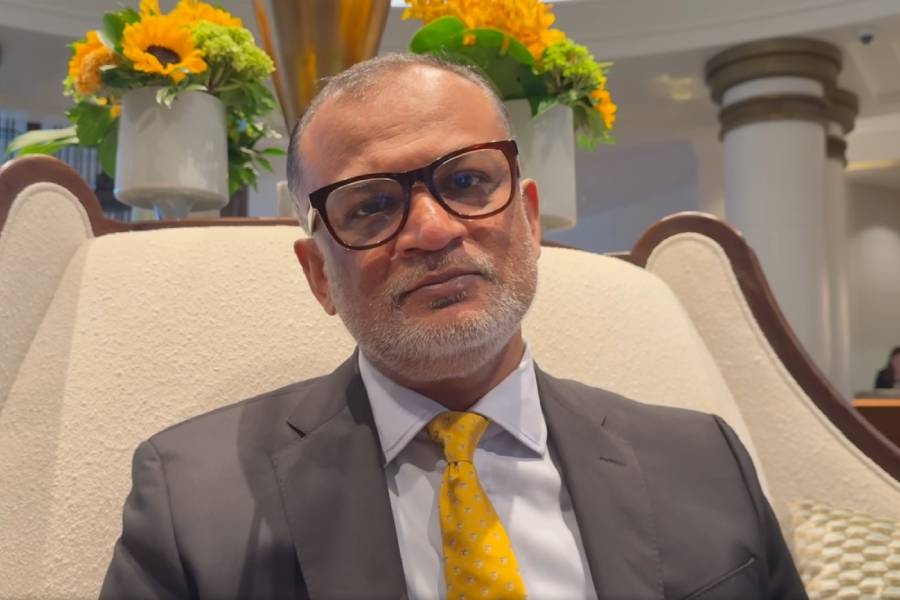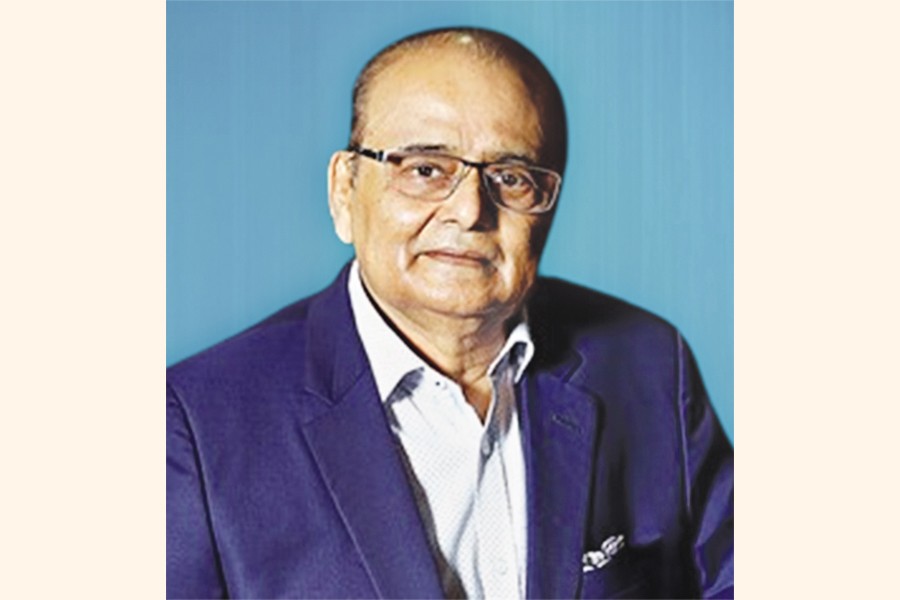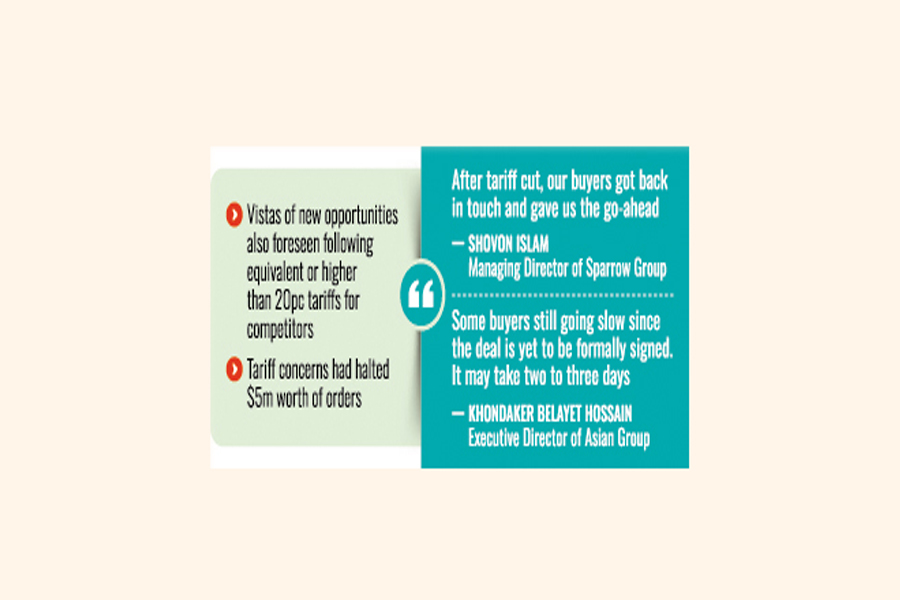As Trump tariff tempest calms, US buyers begin activating trade
Some already ask BD suppliers to resume production, shipment
Jasim Uddin
Published :
Aug 02, 2025 23:36
Updated :
Aug 02, 2025 23:36
Apparel exporters and their US buyers are gathering wits for full-steam resumption of trade as the Trump tariff tempest calms with the United States deciding to settle on a pared-down 20-percent reciprocal tariff on Bangladeshi exports.
Some of the buyers are already asking their suppliers to resume production and shipment which previously had made a pause amid uncertainty over the threatened 35-percent reciprocal tariff and breathtaking negotiations to scale the barrier, according to the industry-insiders.
Talking to The Financial Express, Shovon Islam, Managing Director of Sparrow Group, one of the leading US-focused exporters with annual exports of around $300 million-more than half to the US-said the tariff concerns had halted approximately US$5 million worth of orders, equivalent to 300,000 pieces of garments.
"But, after the tariff was reduced to 20 per cent, our buyers got back in touch and gave us the go-ahead," he said about the turnaround.
Nearly one and half a dozen iconic US buyers have not asked for halting their production or passed on the burden of the further tariff hike. "As I have discussion with many retailers, they are ready to increase their retail prices considering tariff and other costs, which may cause a reduction in apparel demand and result in lesser orders for next couple of months."
He adds: "Even with the new rate, they haven't asked for any cost-sharing-they absorbed the impact themselves."
Similarly, Asian Group, a leading apparel exporter based in Chattogram, with annual exports worth $340 million-93 per cent of which go to the US-has welcomed the breakthrough in negotiations.
"Two of our largest US buyers, Target and Walmart, did not halt their production or shipments during the uncertainty," says Khondaker Belayet Hossain, Executive Director of the corporate, Asian Group. "However, some buyers are still taking a wait-and-see approach since the deal has yet to be formally signed. It may take another two to three days before they make further decisions."
After the 10-percent tariff hike in April, a few buyers informally requested cost-sharing measures from suppliers. "They didn't ask directly, but in cases of delayed shipments, they sought up to a 3.9-percent discount-something that hadn't occurred before," Belayet notes.
Now that the reciprocal tariff has been fixed at 20 per cent, he anticipates that some buyers might again seek partial cost-sharing. "It really depends on the strength of the buyer-supplier relationship. When suppliers have leverage, buyers are more cautious," he says.
He also emphasizes the need for Bangladeshi manufacturers to reduce dependency on a single market like the US and focus on lowering production costs by at least 1.0 to 2.0 per cent. "Factories must invest in automation and adopt industrial engineering methods to reduce wastage and boost efficiency," suggests Mr Belayet, a former BGMEA director.
SM Majedur Rahim, Director of Giant Group, another major exporter with 70-percent capacity dedicated to the US market, echoes the sentiment.
"This reciprocal tariff rate brings immediate relief to both buyers and suppliers," he says. "It restores some competitiveness for Bangladeshi exporters."
He notes that while most buyers are on summer holidays, conversations are ongoing. "Buyers are now assessing how the new tariff-effective from 7 August-will affect final retail prices."
He warns that rising retail prices could suppress consumer demand in the US. "Next month's orders may see some slowdown. But Bangladesh is still in a relatively favourable position because we export basic, low-cost products."
Rakibul Alam Chowdhury, Chairman of RDM Group, which exports $65 million annually-70 per cent of which go to the US-informs that production for some previously halted orders has now resumed.
"Buyers who had paused production for goods scheduled to ship after 30 July have now asked us to restart," he told the FE. "We expect formal confirmation once US offices reopen fully on Monday."
Exporters are still uncertain about the 40-percent local-value -addition requirement tied to the tariff regime. "We don't know yet whether this clause applies. If it does, some factories will struggle, because achieving that level of local value addition isn't feasible for all products," Chowdhury added.
He urges manufacturers to build direct relationships with buyers instead of relying on buying houses. "To improve value addition, exporters must enhance their in-house merchandising capabilities," said Chowdhury, a former BGMEA vice president.
SM Khaled, Managing Director of Snowtex Group, another major exporter, says a large order from a US buyer had been on hold but is now expected to be confirmed within the next week.
"We haven't had formal communication yet, but the fear that the order might shift to another country is largely gone," he says, on a note of relief. "Now, the question is how much they will order, because prices will rise, and that could dampen consumption."
As Bangladesh faces 20-percent tariff-compared to Vietnam's as much, 20 per cent, and India's 25 per cent-its competitive standing has improved, but Mohammad Hatem, President of the Bangladesh Knitwear Manufacturers and Exporters Association (BKMEA), feels that exporters must stay alert.
"President Trump could revise tariffs on India or change Vietnam's trade status at any moment," he warns. "We must be proactive and not allow buyers to pass the entire tariff burden onto us. Tariffs have risen for everyone, and right now, Bangladesh has no direct substitutes."
Hatem also points out that China's declining export volume presents an opportunity. "Vietnam, due to its dependency on Chinese raw materials, could face challenges. With combined tariffs on Chinese-origin products reaching up to 64 per cent, many buyers will be looking for alternative sourcing options-and Bangladesh stands to gain."













































